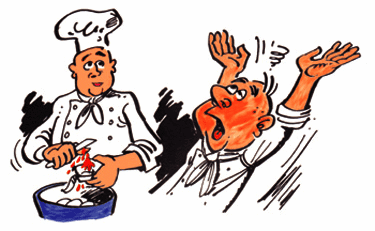hem-, haem-, hemo-, haemo, hema-, haema-, hemato-, haemato-, hemat-, haemat-, -hemia, -haemia, -hemic, -haemic
(Greek: blood)
The presence of hemoglobin in the urine: Hemoglobinuria is caused by a large amount of intravascular hemolysis in which an excessive amount of red blood cells are destroyed. This process releases free haemoglobins into the plasma. Surplus haemoglobins are filtered out by the kidneys and is excreted into the urin.
hemogram
A complete detailed record of the findings in a thorough examination of the blood, especially with reference to the numbers, proportions, and morphologic features of the formed elements.
hemoid
hemolagnia, hematolagnia, haematophilia
1. Sexual stimulation from blood.
2. A blood fetish (also known as vampire fetish) is a sexual fetish for blood.
2. A blood fetish (also known as vampire fetish) is a sexual fetish for blood.
Blood fetishists are most often aroused by blood on nude or semi-nude individuals (or indeed their sexual partner).
Other blood fetishists are aroused simply by the sight of blood; such as, when seeing an accidental or intentional cut or a blood donation.
hemolysis
hemolytic
A reference to hemolysis, the destruction of red blood cells which leads to the release of hemoglobin from within the red blood cells into the blood plasma.
An abnormal condition or disease of the blood: In his medical studies, Jonathan learned about hemopathy pertaining to the unusal and peculiar infections of the hemopoietic tissues and blood of a person's body.
hemophagy, haemophagy, hematophagous, haematophagous
The habit of certain creatures, or organisms, to feed on blood.
Some intestinal nematodes, such as the Ascaris, feed on blood extracted from the capillaries of the gut and many species of leeches are examples of hematophagous creatures.
Some fish; such as, lampreys, and certain mammals, especially the vampire bats, also practice hematophagy.
Among the hematophagous insects of medical importance are the sandfly, blackflies, tsetse flies, bedbugs, assassin bugs, mosquitoes, ticks, lice, mites, midges, chiggers, and fleas.
An individual who is affected by irrepressible bleeding; haemophiliac; bleeder: Joe's brother was a hemophile, or haemophile, who had to be especially careful when working in the kitchen with cutting tools.
Any of several hereditary blood-coagulation disorders in which the blood fails to clot normally because of a deficiency or an abnormality of one of the clotting factors: Hemophilia is a recessive trait associated with the X-chromosome that is manifested almost exclusively in males.
hemophilic (adjective), more hemophilic, most hemophilic
Referring to one of the hereditary blood-coagulation ailments: In his class in medicine, Bruce read a study about hemophilic patients and their problems.
In biology, a microorganism growing well in blood or in a media containing blood: Normally there aren't any hemophilies in blood, but sometimes bacteria can be detected in blood tests and must be treated.
hemophobic (adjective), more hemophobic, most hemophobic
Descriptive of anyone who has a dread of seeing blood regardless of the cause: The horror film showed an excessiveness of bloody crimes, and, as a result, it caused many hemophobic people to leave the theater before the movie ended and to publicly condemn the excesses until the film was banned from further presentations.


hemophthisis, haemophthisis
Anaemia, or anemia, resulting from the abnormal degeneration, or destruction, or a deficiency in the formation of red blood cells.
hemopoietin
The production of erythrocytes (one of the elements found in peripheral blood); in the fetus and neonate it takes place in the spleen and bone marrow, but in older individuals it is confined to the bone marrow.


